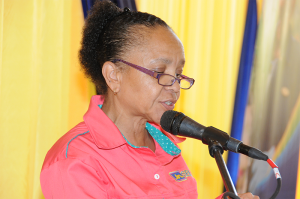The country’s premier micro and small business financiers, JN Bank, says it is critical for entrepreneurs to take seriously the matter of climate proofing their operations- not only to improve their chance of recovering faster from disasters, but to also ensure they are better positioned to access financing.
Chief of the SME Unit in the JN Bank Small Business Loans Division, Garfield Palmer, says exposure to climatic activities is among the risk factors that institutions take into consideration when appraising operations, and although it does not necessarily prevent the business from receiving financing, it can slow the process down.
“And in business, time is money,” he quipped. “Therefore, businesses have to take these issues seriously to mitigate loss and ensure continuity.”
“We are situated in a hurricane belt so there is an immediate threat to us that we can’t ignore, and we do see where some of our towns and cities are becoming more and more affected by flooding and other similar activities, so these risks do matter to financial institutions” he said, pointing out that businesses in agriculture and fisheries, for example, are highly vulnerable, but noted that even sectors, such as entertainment, which are indirectly impacted, are at risk.
He said part of the assessment by financiers is to ensure entrepreneurs have a business continuity plan that they can execute to mitigate against various risks, including climate activities. Therefore, it is important for entrepreneurs to have a plan in place.
But not many micro and small entrepreneurs have the skillset or resources to build up resilience to climate activities, Mr Palmer’s colleague, veteran micro financier and JN Bank SBL pioneer, Thelma Yong, underscored, and, therefore, it is also important for financiers to provide this kind of support for businesses they fund.

Thelma Yong, special consultant, JN Bank Small Business Loans Division.
“As a company we have trained businesses on how to prepare for disasters, such as hurricanes, floods and so on and even provided clients with a handbook to supplement what they learned in the training,” Mrs Yong said.
“Building resilience is a necessity, especially because of how frequent incidents have become because of climate change- almost everywhere is affected and all-year-round. The climate cycle has changed significantly,” she emphasised.
The JN Bank SBL pioneer noted that in addition to providing training and education, the more than 20 year-old organisation also incorporated technology from its early days to assist with its support to clients.
“We used GPS to provide GIS reports, which were very useful in identifying those areas where, especially micro clients were most vulnerable, so that we could work with them to recover quickly,” Mrs Yong explained.
Through a partnership with the Inter-American Development Bank, the Ministry of Industry, Investment, Commerce, Agriculture and Fisheries, and the Development Bank of Jamaica, the company also offered climate resilience financing at a mere four per cent, which it dubbed the Climate Smart Loan, targeting mainly businesses in tourism and agriculture for mitigation and adaptation. Although the programme has expired, the bank has solutions within its suite of products tailored to support clients, such as the TEF Loan programme, offered through funding from the Tourism Enhancement Fund, and Agri loans to boost the capacity of businesses operating in the agricultural and tourism sectors.
“It’s very important for businesses to take the matter of climate resilience very importantly because climate change is real, and our businesses, especially our small and micro businesses, are extremely important to our economy. The stronger they are, the more resilient we are as a country,” Mrs Yong concluded.






